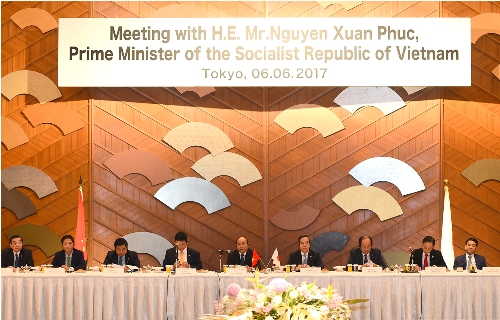 |
|
PM Nguyen Xuan Phuc chairs a seminar with 60 Japanese businesses operating in IT in Tokyo, Japan, June 6, 2017 - Photo: VGP/Quang Hieu
|
He welcomed Japanese enterprises to pour investment and launch operation in Viet Nam for mutual benefits, affirming the recent report of the Japan External Trade Organization (JETRO) that 90% of Japanese businesses believing that the expansion of operation in Viet Nam help increase revenue and 66.6% of whom investing in Viet Nam have plans to expand operation in Viet Nam.
Viet Nam has launched drastic measures to reform institutions and law, improve the business environment and promote start-up, he said.
The two PMs consented that the two nations are heading to a new era in their relationship, said Mr. Phuc, supposing that in the fourth industrial revolution, Viet Nam is transferring economic force into high value sectors using advanced technology and high-quality labor.
Viet Nam has full advantages of many areas, especially agriculture, IT, tourism and training. In 2016, the nation earned US$55 billion from exporting phones, computers, cameras and spare parts.
Viet Nam is taking the lead in economic index in mobile application among the top six nations in ASEAN and striving to be listed among the world’s top software outsourcing and digital content providers.
The Vietnamese PM called on all Japanese investors, businesses and corporations to invest in high-tech, environmentally-friendly and human resources development projects in Viet Nam.
The occasion, he welcomed all Japanese enterprises to join activities of APEC Viet Nam 2017, as it creates an opportunity for foreign enterprises to seek for further investment in Viet Nam.
The representatives of Japanese businesses asserted to make efforts in promoting the two nations’ relations and Viet Nam’s socio-economic development.
Japan is the largest Official Development Assistance provider, the second largest Foreign Direct Investment (FDI) source and the fourth largest trade partner, of Viet Nam.
At the end of 2016, Japan invested in 3,200 projects in the Southeast Asian nation with a total registered capital of more than US$42 billion, accounting for 15% of the total.
By Thuy Dung